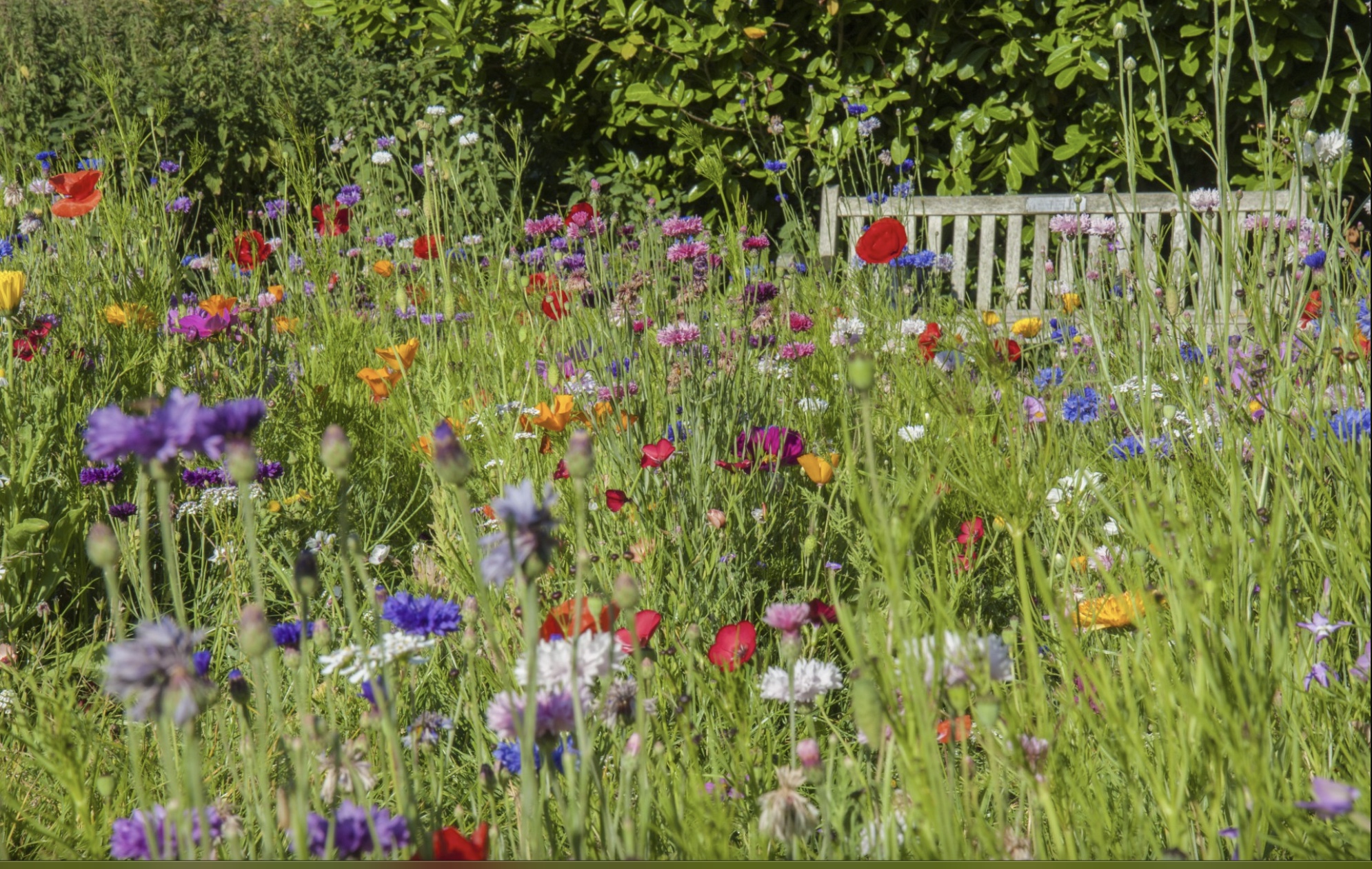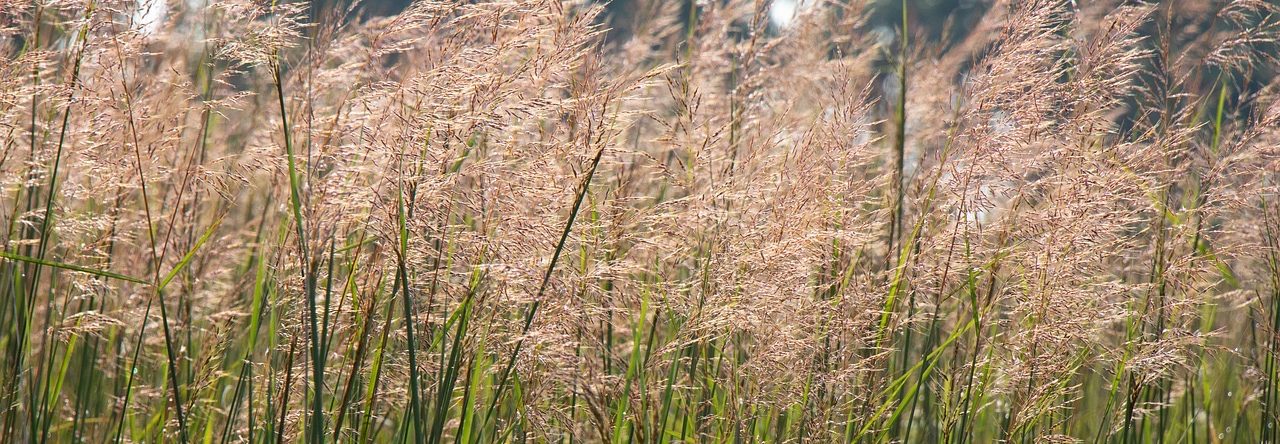 Ditch your lawn
Ditch your lawn
By: Madeline Cintron
Across the country, acres of land are being used to grow one thing—turfgrass. [1] Turfgrass used in many lawns is nonnative, and it usually takes up the entire lawn, creating a monoculture environment.[2] While a grassy lawn may be better than pavement, the carbon cost of maintaining that lawn likely outweighs the carbon benefit.[3] Grassy lawns need extra maintenance and act as a dead space for pollinators and other native wildlife.[4] One yard may seem like a small thing, but small steps taken by masses of people can influence climate change.[5]
Why should you consider native plants?
One option to reduce the negative impact of your monoculture yard is to stop traditional maintenance. “No Mow May,” a movement that has become popular in the United States, was established by a conservation charity, Plantlife, to encourage people to temporarily stop mowing their lawns and allow flowers to bloom instead.[6] Studies that support No Mow May’s goals show that reducing mowing frequency benefits bees and other pollinators and insects.[7] However, while No Mow May has good intentions, you can likely help pollinators more if you replace your lawn with native plants.[8]
Replacing your lawn with native plants can be a long-term solution to dealing with climate change in your own yard.[9] There is a plethora of information about native plants in books and online, but a good place to start finding information on which plants are native to your area is your state extension office.[10] A state extension office focuses on providing free, unbiased researched based recommendations to the public, and many have multiple articles and resources about local native plants.[11] Native plants not only create a wildlife habitat in your yard, improve air quality, and prevent water run-off, but they also are low maintenance and are usually stronger and more resilient than non-native plants.[12]
Are there legal consequences if you ditch your lawn?
Depending on where you live, a lawn may be legally required, or in some less common cases, completely banned.[13] Across the country, most zoning laws require lawns in some form.[14] However, Nevada legislators passed a law that mandates the “elimination of ‘nonfunctional turf,’ defined as grass that is decorative and rarely used, in hopes of saving water.”[15] Many homeowner’s associations have rules that allow them to fine homeowners if they do not have a green lawn.[16] However, some homeowners don’t let such outdated rules stop them; they instead act against these types of mandates by going to court and winning.[17] While it’s best to follow the rules and regulations in your area, replacing your lawn with native plants will likely be better for the environment and help combat climate change one yard at a time.
____________________
[1] Jiahn Son, Lawn Maintenance and Climate Change, Princeton Student Climate Initiative (Dec. 15, 2023), https://psci.princeton.edu/tips/2020/5/11/law-maintenance-and-climate-change.
[2] Jeanie Chung, Rip out your lawn, UChicago Magazine, Summer 2018
[3] Id.
[4] Id.
[5] Don’t Feel Bad Not Mowing the Lawn, it’s Actually a Good Thing, Newsroom Univ. of N.H. (Jun. 1, 2022), https://www.unh.edu/unhtoday/news/release/2022/06/01/dont-feel-bad-not-mowing-lawn-its-actually-good-thing.
[6] Bee City USA, No Mow May, Low Mow Spring, https://beecityusa.org/no-mow-may/#:~:text=No%20Mow%20May%20was%20first,to%20help%20early%20season%20pollinators (last visited Dec. 15, 2023).
[7] Id.
[8] Id.
[9] Why some homeowners are choosing to replace their lawns with native plants, NPR WBEZ Chicago, (Aug. 22, 2023), https://www.npr.org/2023/08/22/1195172505/why-some-homeowners-are-choosing-to-replace-there-lawns-with-native-plants#:~:text=Native%20plants%20aren’t%20just,native%20plants%20in%20their%20yards.
[10] TheSpruce, What is an Extension Office? Here’s What It Can Do for You, (Oct. 20, 2021) https://www.thespruce.com/what-is-an-extension-office-5189448
[11] Id.
[12]Residential Design 5 Reasons native plants help you save money and the planet, Am. Soc’y of Landscape Architects (Dec. 15, 2023, 4:29 PM), https://www.asla.org/nativeplantssavemoney.aspx#:~:text=Native%20plants%20help%20the%20environment,for%20mowers%20and%20other%20equipment.
[13] Bee City USA, supra note 6.
[14] Dan Malouff, Grassy lawns should not be mandatory, StrongTowns (Jul. 31, 2017), https://www.strongtowns.org/journal/2017/7/28/grassy-lawns-exist-to-prove-youre-not-a-peasant
[15] Nat Lash, Las Vegas Needs to Save Water. It Won’t Find It in Lawns (Jun. 7, 2023), https://projects.propublica.org/turf-wars/#:~:text=In%202021%2C%20the%20Nevada%20Legislature,football%20fields)%20within%20six%20years.
[16] Derek Lacey, Fine, Lien, Foreclosure: What Can Happen if you Refuse to Mow Your Lawn (updated Aug. 20, 2023), https://www.lawnstarter.com/blog/lawn-care-2/fines-liens-foreclosure-refuse-mow-lawn/
[17] Cara Buckley, They Fought the Lawn. And the Lawn’s Done., N.Y. Times (Dec. 14, 2022), https://www.nytimes.com/2022/12/14/climate/native-plants-lawns-homeowners.html

